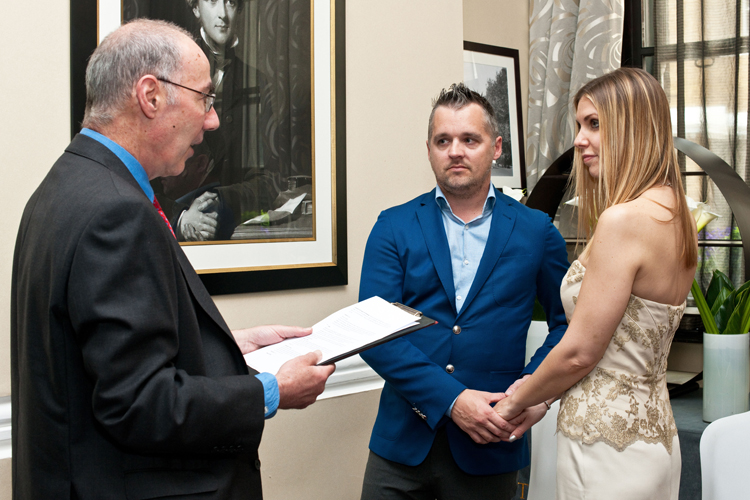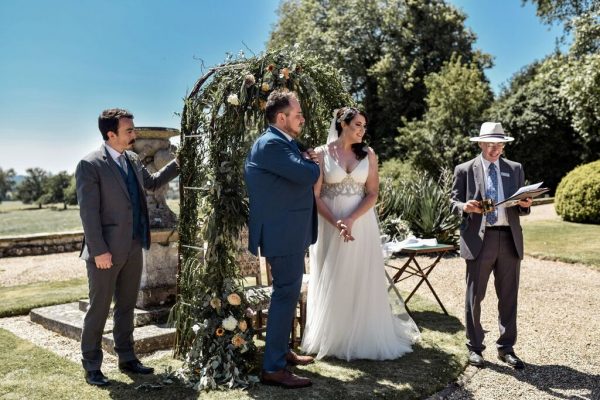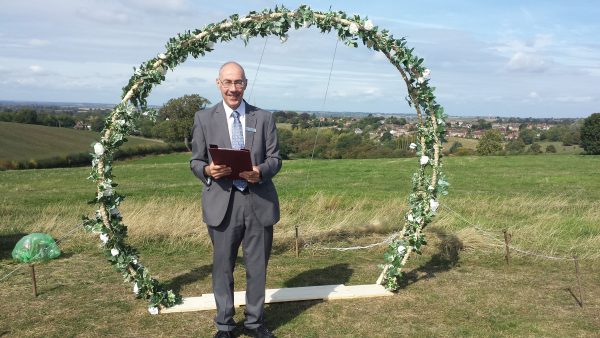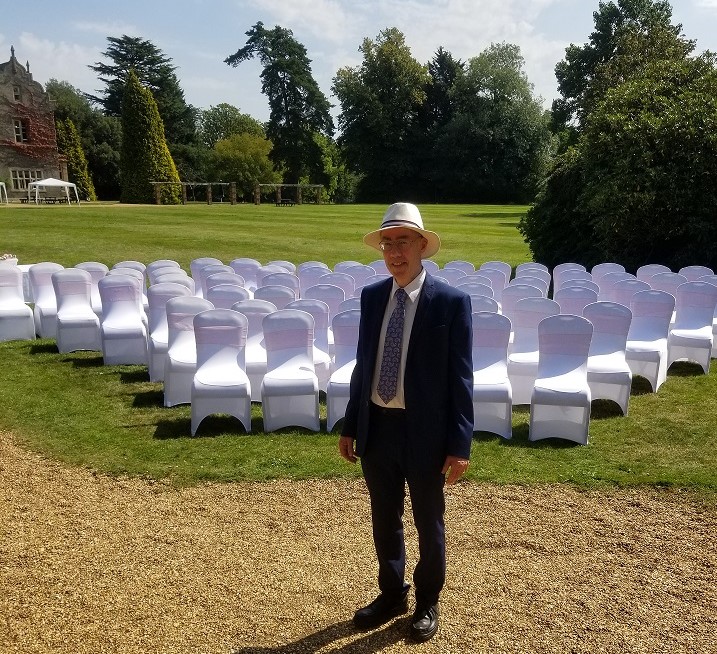
by Michael | Aug 9, 2021 | Blog
No, no! Not “when you’re totally tanked up with booze”!
What I’m actually referring to is the most advantageous time, day and type of ceremony for you.
Of course, your hands may be tied, depending on the type of ceremony you have in mind and the venue.
Register Office
If you choose to marry at a Register Office, you need to make an appointment and go down (with two witnesses) on a working day.
At the time of writing, most (if not all) registrars conduct the ceremony from their base, rather than attending a licensed venue. (If they come out, there require certain criteria to be met, such as venue specifics and timings. They also charge quite a lot for this service.)
A bill is going through Parliament (slowly!) that may allow certain celebrants to conduct legally-binding weddings, which may obviate the need to involve the registrars.
Which brings me on to your next possible choice.
Less Conventional Ceremonies
If you want a unique, tailor-made service, then, once your marriage has been made legal by the Registrars, you can use an independent celebrant. Such a ceremony can take place at the venue of your choice, be it a hotel, an iron age fort, a canalside, or wherever (subject to permission). It can also take the form of your choice (eg personalised), which is where the celebrant comes in.
When to Marry
As a rule of thumb, you may be able to make savings, if you avoid high season. That may also suit your guests better. If you choose New Year’s Day, there might be problems for those travelling by public transport or indeed for those nursing hangovers!
Valentine’s Day makes sense at one level, but suppliers often raise their prices for such a day.
Summer is popular, but is not always the best bet. Apart from higher prices, weather (as we are seeing this year!) is not guaranteed, and you may be safer booking Spring or Autumn. If you leave it too late and you book for the Summer, you may find that many of your potential guests have already booked their holidays and can’t attend your wedding.
Destination weddings also need considerable notice for most guests.
Savings
It’s often worth discussing possible discounts with your supplier. The worst that can happen is that they refuse!
Possible bargaining levers are holding the wedding out of season (as mentioned), holding it in the morning or afternoon, and choosing a Monday through Thursday.
Conclusion
There’s plenty to think about, then, but I hope that these remarks shed some light, at least. You may need to be flexible and certainly need to do some research, but the results can be so worthwhile.
Never forget that it is your big day, and you should have what you want.
Do speak to me, if I can help you further.
Photo: Victor Shack

by Michael | Jun 21, 2021 | Blog
Unless your ceremony is taking place at home or in the back garden, you’re going to be looking to hire a venue. That’s something you should take seriously, as the atmosphere and facilities can make all the difference to (probably) the biggest day of your lives.
Starting the Search
You may be lucky, and either know from experience where you want the ceremony to take place or have recommendations from reliable acquaintances.
If not, decide on the area and also on your budget. Then go online and google in local wedding venues. The website will be a good starting point, because if the text and pictures fail to attract you, you’re on to a non-starter straight away! It’s so important that you feel the venue is right and is where you want to be married.
The Spadework
Make a list and arrange to visit the top three or so. Ensure you see the event planner, and be ready to ask questions.
You may want to know any of the following:
- What availability do they have?
- What exactly does the booking fee include?
- Will the event planner be there on the day?
- Can you bring in outside suppliers of your choice?
- If outdoors, what arrangements are available if the weather is inclement?
- Can you have the ceremony in one room and the reception in another?
- Do they have tie-ins with registrars (ie will these come out to the venue)? [Not happening currently.]
- Do they supply PA systems?
- What cancellation processes do they have?
- How and when do they expect to be paid?
- What is the state of their Risk Assessment (bearing in mind current social distancing)?
The Decision
Provided that you love the venue and your questions have been answered satisfactorily, then go with it. If it is a little too expensive, you lose nothing by asking for a discount. It may well be cheaper, if you marry out of season, in the afternoon or on a weekday.
I always say, when choosing a celebrant or a venue, book the one you really want, even if it may mean allocating a little less money than you had planned to another service.
To discuss any of this, please contact Michael.

by Michael | Apr 26, 2021 | Blog
Most people have little, or no, experience of putting together a ceremony. The internet can offer some help, but consulting a professional is wise. However, how do you know which supplier is going to be a match for you?
Of course, you’ve got to decide what you want and how much you are willing to spend. One rule of thumb is that, if you really like someone but they’re just out of your price range, it’s worth going with them. You can probably cut a corner elsewhere to cover the shortfall.
I’m not going to talk here about the reception, as my brief is the ceremony. There are still decisions to be made, though.
The venue and the officiant are paramount – and will each have their own advantages as well as potential drawbacks.
Venue
If you are not marrying in church, you essentially have two choices: the Register Office or a venue such as a hotel. If the venue is not licensed for weddings, you need to go to the Register Office first (with two witnesses). Then you can have the wedding of your dreams (see next section) in the venue of your dreams.
If you’re choosing a hotel, say, make sure you have visited – and love – it. Ensure you have spoken to the Event Planner and understand exactly what the terms and conditions are. For example, does your hire cover the whole venue? What about payment terms? What social distance safeguards are they employing? What happens if you have to cancel?
Celebrant
If you’re going with a celebrant as officiant, there are many different types. Humanists should not even mention “God” or include any religious elements in their service (though a few do seem to be doing that nowadays). Wiccan celebrants will include pagan (nature-related) elements. Then there are independent celebrants who will include some conventional religious readings or rituals, if desired, but who are comfortable with secular ceremonies.
To clarify, an independent civil celebrant will normally tailor the service to your expectations and beliefs, so you can have as much – or as little – religion as you want. Your day really can be special and the way YOU want it.
Choices
Finally, you need to be sure of venue and celebrant (especially, as you’ll want to be comfortable for your actual marriage).
Personal recommendations are always good. Otherwise, websites will give you an idea, but personal contact is even more revealing. Is this a venue that excites you? Will this celebrant listen to your wishes and be someone you can feel confident about?
Don’t be afraid to ask questions. Check Terms and Conditions and query anything unclear.
If you have any questions in the meanwhile, please feel free to ask me!

by Michael | Mar 23, 2021 | Blog
Do we even need wedding suppliers these days? After all, with social distancing and government regulations limiting the size of ceremonies, we’ve moved towards small-scale ceremonies.
Can’t we manage on our own now?
Maybe, but I would be less than sanguine as soon as the guest-list goes into double figures. (hopefully, next month!)
DIY
If you’re doing it yourself, you can easily go to the Cash & Carry and buy in a load of food and drink. Oh, you’ll probably want to clean your front room up first before putting up the ribbons and bunting. How will you serve refreshments? How will you arrange the room to accommodate a relatively large number? Are you using the back garden? Supposing it rains? Have you warned the neighbours? Will there be a sound system? Have you avoided trailing wires and trip hazards?
So, rather than exhaust yourself before the event even starts, it may be wiser to hire some professional suppliers.
Wedding Planner
Even if circumstances don’t change, then consider a professional wedding planner. Given their contacts with suppliers, they may work out cheaper than you envisage!
Otherwise, there may be an event planner who comes with the venue you book. Of course, if you’re confident you can handle it – go for it yourself.
Venue
Visit venues until your heart says “yes”. Obviously, the price must be right and you must feel happy about the planner there.
Be aware that you may have to give the venue a lot of notice.
Ceremony
You may not be having a full religious service. However, you may want more than the Registrars’ standard ceremony. They do the legal bit, but they do not personalise. For that, contact a civil celebrant.
Civil Celebrants
Working together with your civil celebrant, you can achieve the unique ceremony of your dreams.
If current law proposal proceeds, soon the celebrant may actually be able to conduct a personalised, but fully legal, ceremony at one and the same time.
Musicians and Entertainment
You may want music, either at the wedding ceremony or at the reception (or both). Decisions to make include whether it should be live or recorded, and whether you’re having a DJ or a friend to push a button.
Make sure you know who is providing the sound equipment.
Catering
Again, this is where a planner can earn their keep. Are you having some drinks and hors d’oeuvres before the meal? Will the meal be buffet or silver service? What – and how much – drink will you offer? Will you have a cash bar? What about vegans and those on gluten-free or dairy-free regimes? Do you want a special table for children?
Photographers
Don’t neglect a photographic record of your big day. How many photographers – or videographers – you have is down to you. Don’t ask a friend to do it (even though you save money): he/she may accidentally fail to deliver, which you really wouldn’t thank them for. Moreover, the friend is there to be part of your wedding, not to worry about the pictures.
Florists
Most of us want flowers at such an occasion – seasonal ones are usually cheaper than ones flown in.
There may well be other suppliers you’d want to employ (such as drivers, cake-makers, magicians), but I hope that this article gives at least a reasonable idea of what may be involved in planning a wedding.
It may look daunting, but professional suppliers can manage it smoothly for you.
If you have any questions or comments, especially about ceremonies, please feel free to contact me.

by Michael | Feb 16, 2021 | Blog
Even in these troubling times, it’s well worth choosing your venue with care. Even if it’s a micro-wedding, you’re going to want the vibes to be right. That means seriously considering where you hold your ceremony.
Don’t leave it to the last moment! Not least because the venue of your choice may well be booked up a year ahead, or even more.
Furthermore, a rushed decision is not always the wisest one.
So take the trouble to do some research.
Starting off
Friends or relatives may be able to recommend a place. So go along and see if it suits you too.
You don’t have to be restricted by convention. You are not limited to a church, the Register Office or even a hotel, if a civil celebrant is conducting the ceremony. Perhaps an iron age fort appeals or a Canal Centre.
Geography may be a major factor too. The point is that, even these days, you may be able to choose an atmospheric or significant site for your big day.
The process
Although consulting venue websites is useful, go in person to see the likely ones. Then you can sense the atmosphere and beauty of the place (essential before you make your decision). Don’t neglect to make an appointment with the events planner before you leave.
Before all else, ensure the venue is available all the time that you will want it.
The big mistake
When you’re choosing your suppliers – be they florists, civil celebrants, wedding planners, musicians, photographers, or whatever – don’t go for the cheapest! Obviously, you have to respect your budget, that’s a given. But you need to go with a supplier that you feel you can trust and whom you want to work with. That may come at a cost, and you may have to try and make savings somewhere else.
The visit
Apart from the surroundings, your chat with the event planner can be paramount. Do you like them? Do they understand your vision? Do they seem to have your interests at heart? Do they seem dependable?
Have a list of questions. These may include capacity and catering, exactly what the hire entitles you to, whether the planner will be on hand on the day, décor and logistics (like parking or microphones), cancellation policy, and so on.
If you find a venue you love (not just “like”!), go for it. If you need to cut a few corners, you can often negotiate a discount depending on when you hold the event.
For example, it’s cheaper to book a venue out of (summer) season (and not Xmas and Valentine’s Day) and to avoid Saturdays or Fridays. Afternoon, rather than evening, can be cheaper too.
Visit several venues (with the same questions), and you can compare.
It sounds like a lot of “homework”, but it’s your big day, and it’s so important to get it right.
Feel free to call me to discuss any of this further.





